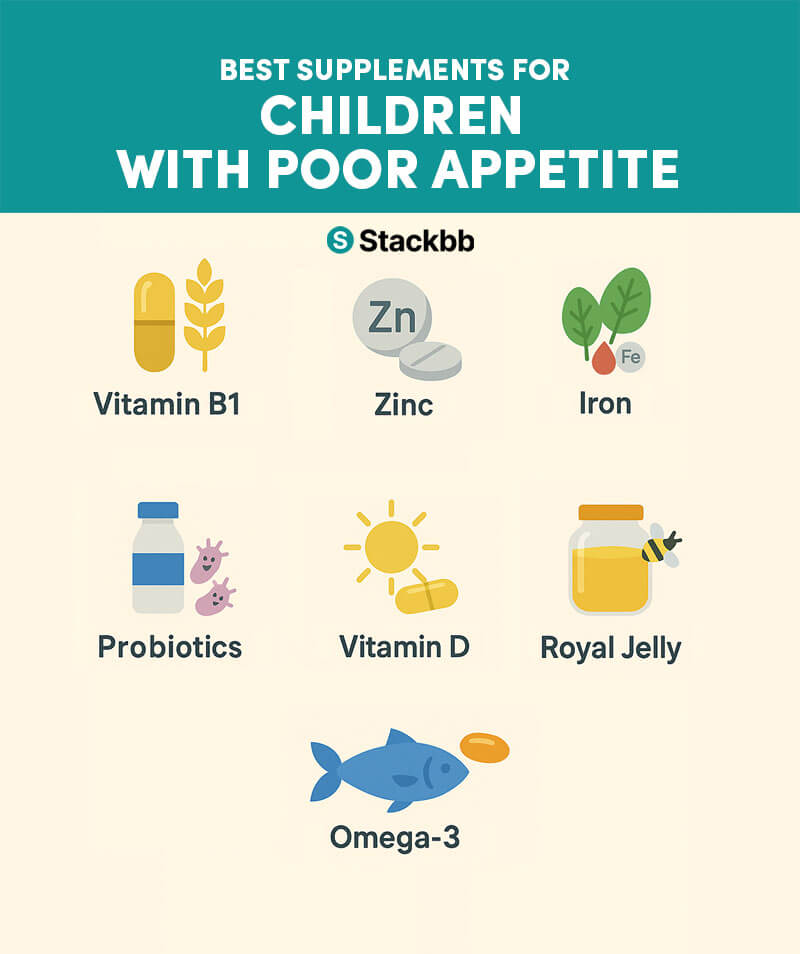
Best Supplements for Children With Poor Appetite

Loss of appetite in children is common, whether it’s due to growth phases, minor illnesses, or simply being a picky eater. While the first step is always to rule out medical causes with a pediatrician, some vitamins and natural supplements may help support a healthy appetite in kids. Here’s a closer look at the most relevant ones.
Vitamins and Minerals That Support Appetite
Vitamin B1 (Thiamine)
Thiamine plays a key role in how the body converts food into energy. Low levels of this vitamin have been linked to reduced appetite and fatigue. Adding more B1 through diet or supplements may help children who tend to skip meals.
✔️ Typical Dosage Range: 5–10 mg daily, depending on age and medical guidance.
Zinc
Zinc is essential for taste and smell, both of which directly affect appetite. Children who are low in zinc may find food less appealing. Supplementation has been shown to encourage eating in picky eaters.
✔️ Typical Dosage Range: 5–10 mg daily, best taken with food.
Iron
Iron deficiency can cause fatigue, weakness, and a loss of appetite. If your child has been diagnosed with anemia, iron supplements may help restore both energy and hunger levels. Iron should always be taken under medical supervision.
✔️ Typical Dosage Range: 7–10 mg daily for young children, based on doctor’s advice.
Vitamin D
Vitamin D supports overall growth and bone development. While not a direct appetite stimulant, adequate vitamin D can improve energy and wellbeing, which indirectly encourages better eating habits.
✔️ Typical Dosage Range: 400–600 IU daily, depending on age.

Natural Supplements That May Help Kids Eat Better
Royal Jelly
Royal jelly is a nutrient-rich substance made by bees and traditionally used to boost vitality. Some parents find it helps children with low energy and poor appetite, though more studies are needed.
✔️ Typical Dosage Range: 100–300 mg daily in capsule or syrup form.
Probiotics
A healthy gut often leads to a better appetite. Children who have digestive issues or frequent antibiotics may benefit from probiotics, which help restore balance in the gut microbiome and improve digestion.
✔️ Typical Dosage Range: 1–5 billion CFU daily, depending on the strain.
Omega-3 (Fish Oil)
While omega-3s don’t directly stimulate hunger, they support brain development, mood, and overall growth. Children who are calmer and have balanced energy may be more willing to eat at mealtimes.
✔️ Typical Dosage Range: 250–500 mg combined EPA/DHA daily.
Lifestyle and Diet Tips for Picky Eaters
Supplements can help, but daily habits matter just as much. Offer small, frequent meals, avoid filling snacks or drinks before meals, and introduce new foods slowly. A positive mealtime atmosphere can go a long way in encouraging better eating.
Safety and When to See a Doctor
Never start supplements without consulting your child’s healthcare provider. If appetite loss lasts more than two weeks, or if it’s accompanied by weight loss or fatigue, seek medical advice. And remember: Over-supplementation with iron, zinc, or vitamin A can be harmful.
FAQ
Can zinc really increase appetite in children?
Yes, zinc plays a role in taste and smell, which influence appetite. Supplementing zinc can help picky eaters if they are deficient.
Is royal jelly safe for kids?
Royal jelly is generally safe in small amounts, but always consult your pediatrician first, especially if your child has allergies.
How long does it take for appetite supplements to work?
It depends on the nutrient. Zinc or iron may take a few weeks to show effects, while probiotics can improve digestion within days.
Should I give multivitamins to a picky eater?
A children’s multivitamin can help cover gaps in nutrition, but it’s best to choose one tailored to your child’s age and needs.
This article was originally published on Stackbb, your trusted source for science-based supplement guides.






